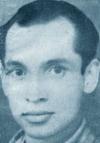Amulya Barua poet from India was born on June 30, 1922, had 42 years and died on August 18, 1964. Poems were written mainly in English language. Dominant movement is political.
Biography
Amulya Barua was the pioneer in modern Assamese poetry. He died in a tragic communal riot at Kolkata on August 18, 1946 at an early age of 24. During his short span of life he wrote a number of valuable poems with his revolutionary pen and left an indelible imprint in Assamese poetical world. With his progressive ideals soaked in deep sense of humanism and socialism he brought a new era in Assamese poetry. His only collection of poems Achina published after his death is now regarded as a precious gem in Assamese literature.
Amulya Barua was born at Jorhat on June 30, 1922. A brilliant student since his school days he started his academic life at Jorhat. In 1941, he passed matriculation examination from Jorhat Govt High School with letter marks in Assamese and got himself admitted into the prestigious Cotton College at Guwahati. But unavoidable domestic problem compelled him to return home and he took admission into JB College at Jorhat. Passing the BA examination in 1945 he went to Kolkata for higher studies and admitted into the MA class of Calcutta University. But the communal clashes that engulfed whole Bengal in 1946 killed Amulya with many other hostel mates at Raja Ram Narayan Street. His immature death was an irrepearable loss to the world of Assamese poetry.
Like many other of his contemporary poets, Amulya Barua also started his poetical career as a romantic poet. But a number of events like the World War, the October Revolution in Russia, the independence movement and unprecedented political upsurge in his own country made him aware of life and livelihood. The socialist theory of Marx and Angels also deeply influenced his sensitive mind. Leaving self-centred emotional tract he chose the logical path of poetry and became vocal against social injustice prevailed in the society.
Amulya Barua was a metaphor of poetical sublimity. He and his poems represent a particular period of our society. He brought modernity to Assamese poetry. He pioneered a paradigm shift in the vision of looking at society and reflected it through his poems. In his own words, he wrote poems 'keeping the eyes fixed towards the glowing red sun of future.' He had full confidence in man and his capacity. A humanist of the highest order, he preached the glory of man in his poems. He established a hearty relation with the proletariat through his poems. His widely acclaimed poem Koyla (coal), published in Cottonian in 1944 is a symbol of struggling people. It is a lively document of transformation of human blood into coal. In his poem Kukur (dog) he cryptically asked, whether we live for eating or eat for living?
An idealist of the highest order, he expressed his deepest sympathy in his poetry for the oppressed and downtrodden masses of the society. Koyla, Kukur, Biplabi, Aji Amar Bihu, Bharatir Muktir Swapna etc bore testimony to his revolutionary sentiment in clear terms. Beishya is a psychological analysis of the eternal tragedy of human life. The poem created ripples in Assamese literary world just after its publication in Jayanti. But many critics appreciated it and called him as Garcia Lorca of Assam.
The most tragic point to note here is that, Amulya Barua who relentlessly fought against communalism and tried to establish humanism as the supreme virtue of man became a victim of communal clashes. Even his dead body was not found for cremation. But the ideals of equality he preached and practised in his poems would always keep him alive as a great humanist of our times. ..






